高中英语人教版(2019)必修第二册Unit 4 History and Traditions(共18张ppt)
文档属性
| 名称 | 高中英语人教版(2019)必修第二册Unit 4 History and Traditions(共18张ppt) |
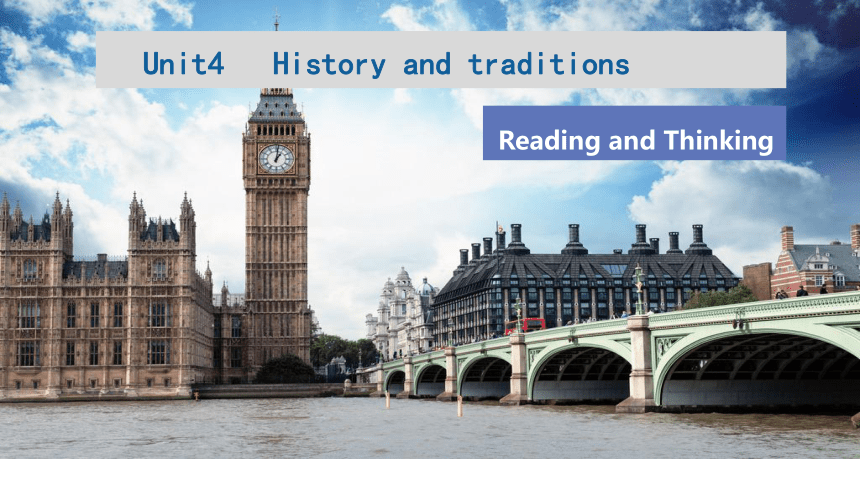
|
|
| 格式 | pptx | ||
| 文件大小 | 4.8MB | ||
| 资源类型 | 教案 | ||
| 版本资源 | 人教版(2019) | ||
| 科目 | 英语 | ||
| 更新时间 | 2023-02-23 20:49:20 | ||
图片预览

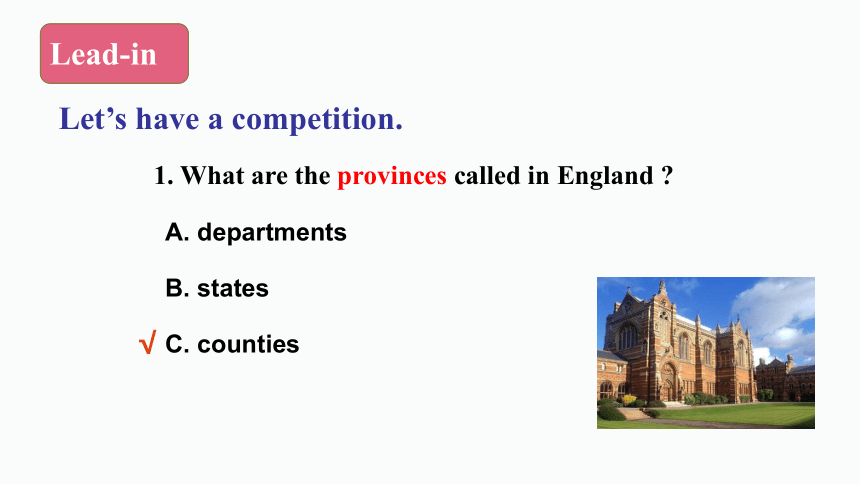

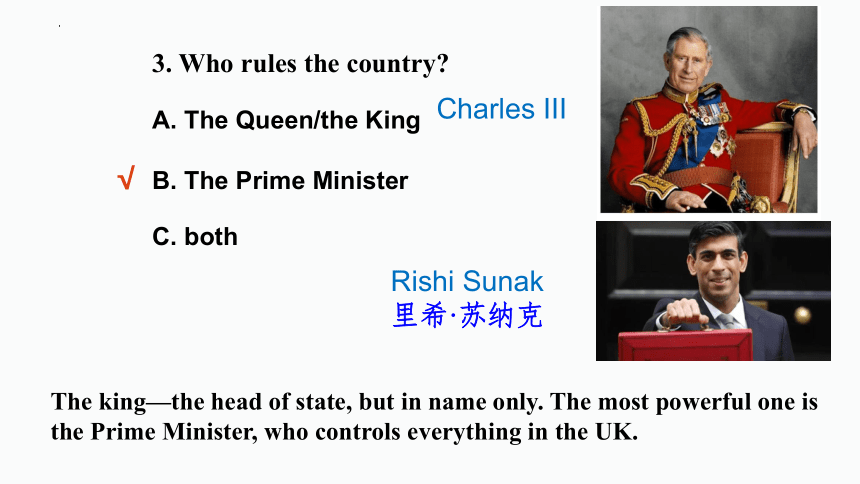
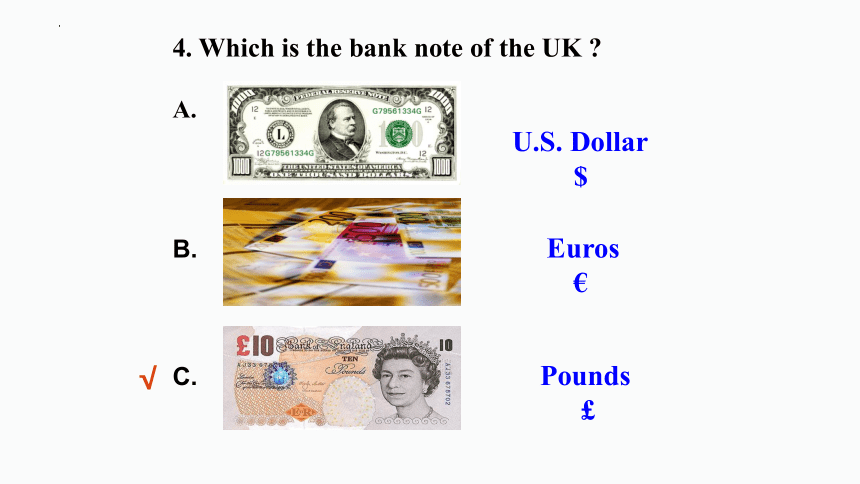
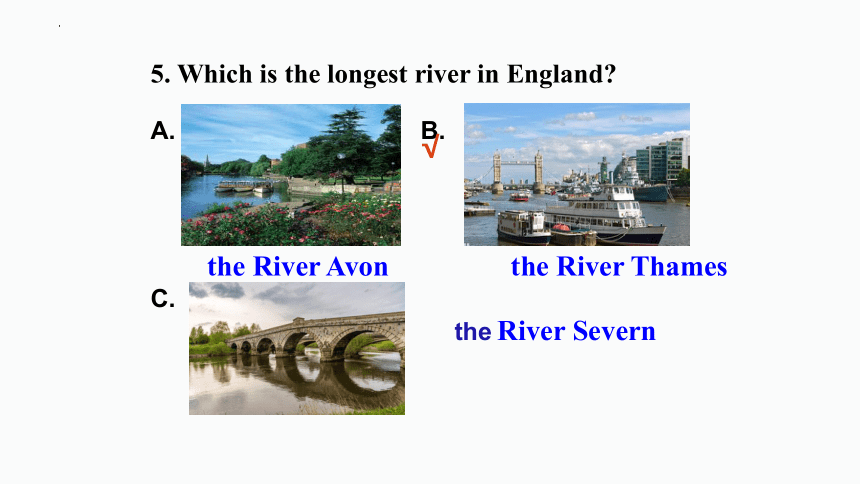
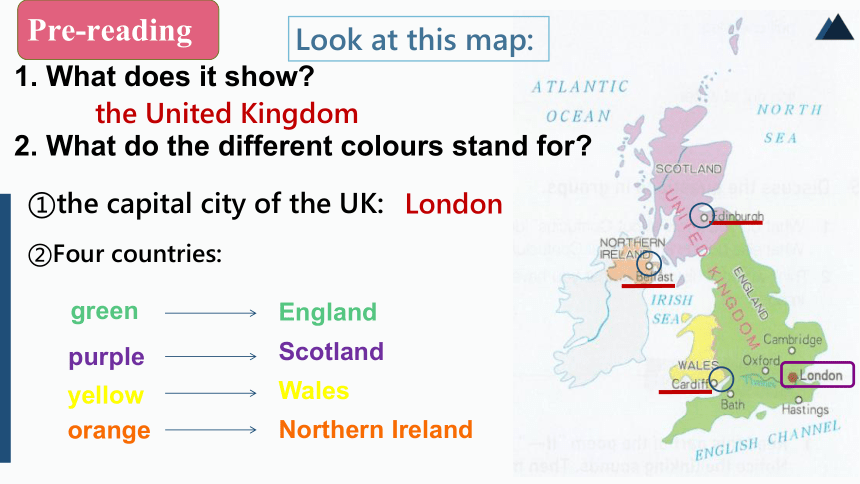
文档简介
(共18张PPT)
Unit4 History and traditions
Reading and Thinking
1. What are the provinces called in England
A. departments
B. states
C. counties
Let’s have a competition.
√
Lead-in
A.
B.
C.
The Union Jack
√
2. Which is the national flag of the UK
3. Who rules the country
A. The Queen/the King
B. The Prime Minister
C. both
Rishi Sunak
里希·苏纳克
The king—the head of state, but in name only. The most powerful one is the Prime Minister, who controls everything in the UK.
Charles III
√
4. Which is the bank note of the UK
A.
U.S. Dollar
$
B. Euros
?
C. Pounds
√
5. Which is the longest river in England
B.
the River Avon the River Thames
C.
the River Severn
√
Look at this map:
①the capital city of the UK:
London
②Four countries:
England
Scotland
Wales
Northern Ireland
the United Kingdom
green
purple
yellow
orange
1. What does it show
2. What do the different colours stand for
Pre-reading
Q1: How many names are used to refer to the UK and what are they?
Q2: What does the author suggest to solve this puzzle?
Para.1
--------to introduce the topic by raising a puzzle
to arouse(激起) interest of the readers
A puzzle
While-reading
Q3:What is the full name of UK
Q4: What are people from the UK called
British.
Para.2 History
the United Kingdom of GreatBritain and Northern Ireland
England +Wales
England +Wales
+Scotland
(Great Britain)
Great Britain
+ Northern Ireland
Great Britain
+Ireland
in the 16th century
in the 18th century
in the 19th century
be joined to
be joined to
be added to
How did UK come into being
in the 20th century
break away from
+
+
=
Similarities _____; _________; ________________
Differences ___________ and _____ systems; __________________ and even ______________ for competitions.
currency
flag
military defence
educational
legal
their own traditions
football teams
Para.3 Similarities and differences
in the 1st century
in the 5th century
in the 8th century
the Anglo-Saxons
the Romans
the Vikings
in the 11th century
the Normans
Para.4 People and traditions
towns and roads
language and houses
vocabulary and
names of locations
castles, legal system and French words
Q7: Is there anything else we can benefit from studying the history of the UK
Q8: Why is London said to be a great place to start
Q9: What impression is given of the UK Any supporting words
Para.5 Trip
20th century
11th century
16th century
18th century
19th century
Romans arrived
Anglo-Saxons came
Vikings came
1st century
5th century
8th century
Normans conquered
Wales was joined
Scotland was joined
Ireland was added
Southern Ireland broke away
Timeline
the Anglo-Saxons
the Vikings
Sort out the information according to the timeline (P41)
When What happened What changed
Romans arrived
Ango-Saxons came
Vikings came
11th century
1st century
5th century
8th century
Normans conquered England after the Battle of Hastings
towns and roads
language and way houses were built
vocabulary and names of locations across the UK
castles built, legal system changed, and new words from French introduced
Post-reading
Sort out the information according to the timeline. (P41)
When What happened What changed
16th century
18th century
19th century
20th century
Wales was joined to Kingdom of England
Scotland was joined to England and Wales
Ireland was added
the southern part of Ireland broke away
“Kingdom of Great Britain” formed
“United Kingdom of Great Britain and Ireland” formed
name changed to “United Kingdom of Great Britain and Northern Ireland”
Complete the conversation about the UK using the phrases in their correct forms.
A: I can never remember what the UK means! There’s England, Britain, _____________ Great Britain!
B: Well, it helps if you remember that there are four countries that ____________ the UK. That’s why it’s called the United Kingdom.
A: Four countries I must have been asleep in that part of our history class! So the first country was England, and the others were ___________ that
B: Yes, right. First England, then Wales, then Scotland. The last country was Ireland, but later the southern half didn’t want to be ___________ the United Kingdom.
A: Oh, I remember now! The southern part ______________ from Northern Ireland, right
B: Yes, you got it well remembered! But ___________________ in history class next time!
as well as belong to add to join to break away keep your eyes open
as well as
belong to
joined to
added to
broke away
keep your eyes open
Practice
Thank You
Unit4 History and traditions
Reading and Thinking
1. What are the provinces called in England
A. departments
B. states
C. counties
Let’s have a competition.
√
Lead-in
A.
B.
C.
The Union Jack
√
2. Which is the national flag of the UK
3. Who rules the country
A. The Queen/the King
B. The Prime Minister
C. both
Rishi Sunak
里希·苏纳克
The king—the head of state, but in name only. The most powerful one is the Prime Minister, who controls everything in the UK.
Charles III
√
4. Which is the bank note of the UK
A.
U.S. Dollar
$
B. Euros
?
C. Pounds
√
5. Which is the longest river in England
B.
the River Avon the River Thames
C.
the River Severn
√
Look at this map:
①the capital city of the UK:
London
②Four countries:
England
Scotland
Wales
Northern Ireland
the United Kingdom
green
purple
yellow
orange
1. What does it show
2. What do the different colours stand for
Pre-reading
Q1: How many names are used to refer to the UK and what are they?
Q2: What does the author suggest to solve this puzzle?
Para.1
--------to introduce the topic by raising a puzzle
to arouse(激起) interest of the readers
A puzzle
While-reading
Q3:What is the full name of UK
Q4: What are people from the UK called
British.
Para.2 History
the United Kingdom of GreatBritain and Northern Ireland
England +Wales
England +Wales
+Scotland
(Great Britain)
Great Britain
+ Northern Ireland
Great Britain
+Ireland
in the 16th century
in the 18th century
in the 19th century
be joined to
be joined to
be added to
How did UK come into being
in the 20th century
break away from
+
+
=
Similarities _____; _________; ________________
Differences ___________ and _____ systems; __________________ and even ______________ for competitions.
currency
flag
military defence
educational
legal
their own traditions
football teams
Para.3 Similarities and differences
in the 1st century
in the 5th century
in the 8th century
the Anglo-Saxons
the Romans
the Vikings
in the 11th century
the Normans
Para.4 People and traditions
towns and roads
language and houses
vocabulary and
names of locations
castles, legal system and French words
Q7: Is there anything else we can benefit from studying the history of the UK
Q8: Why is London said to be a great place to start
Q9: What impression is given of the UK Any supporting words
Para.5 Trip
20th century
11th century
16th century
18th century
19th century
Romans arrived
Anglo-Saxons came
Vikings came
1st century
5th century
8th century
Normans conquered
Wales was joined
Scotland was joined
Ireland was added
Southern Ireland broke away
Timeline
the Anglo-Saxons
the Vikings
Sort out the information according to the timeline (P41)
When What happened What changed
Romans arrived
Ango-Saxons came
Vikings came
11th century
1st century
5th century
8th century
Normans conquered England after the Battle of Hastings
towns and roads
language and way houses were built
vocabulary and names of locations across the UK
castles built, legal system changed, and new words from French introduced
Post-reading
Sort out the information according to the timeline. (P41)
When What happened What changed
16th century
18th century
19th century
20th century
Wales was joined to Kingdom of England
Scotland was joined to England and Wales
Ireland was added
the southern part of Ireland broke away
“Kingdom of Great Britain” formed
“United Kingdom of Great Britain and Ireland” formed
name changed to “United Kingdom of Great Britain and Northern Ireland”
Complete the conversation about the UK using the phrases in their correct forms.
A: I can never remember what the UK means! There’s England, Britain, _____________ Great Britain!
B: Well, it helps if you remember that there are four countries that ____________ the UK. That’s why it’s called the United Kingdom.
A: Four countries I must have been asleep in that part of our history class! So the first country was England, and the others were ___________ that
B: Yes, right. First England, then Wales, then Scotland. The last country was Ireland, but later the southern half didn’t want to be ___________ the United Kingdom.
A: Oh, I remember now! The southern part ______________ from Northern Ireland, right
B: Yes, you got it well remembered! But ___________________ in history class next time!
as well as belong to add to join to break away keep your eyes open
as well as
belong to
joined to
added to
broke away
keep your eyes open
Practice
Thank You
